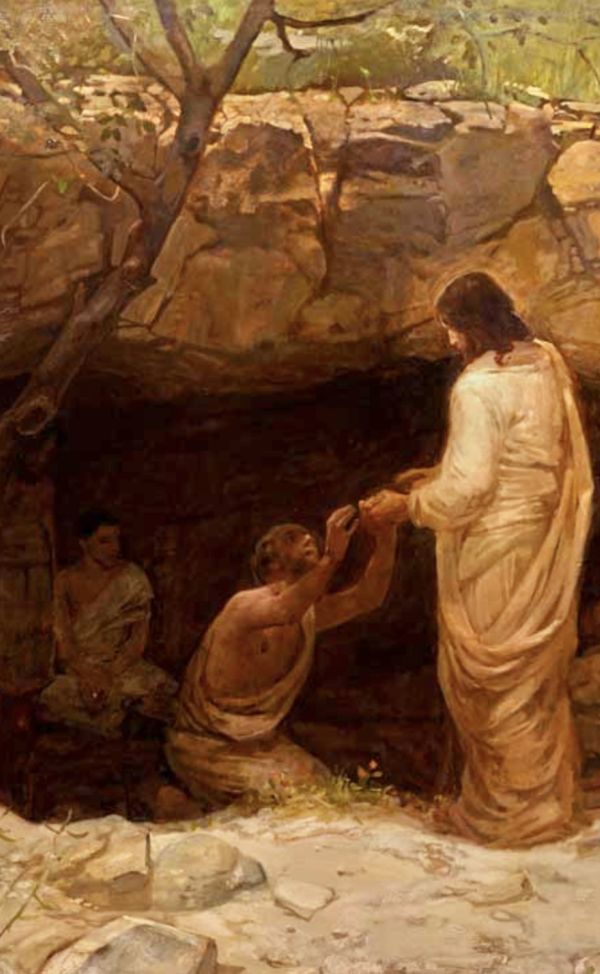(Lk 5:12-16)
The Touch of Jesus sums up his life, teaching and mission: God is all out of the rails, both of old custom and fashion.
He is not afraid to defile Himself - not even with an individual covered with disease and cracks [«full of leprosy»: v.12].
No lepers could live in urban areas, but Lk wants to emphasise that it is the usual way of understanding religion and its infinite casuistry that scatters us.
It is these minutiae [or prevailing ideas] that enervate and make people impure - insinuating nothing but disjointed doubts about their own dignity; to finally clutch a fistful of flies.
Says the Tao Tê Ching (xxxix): «When you have finished enumerating the parts of the chariot, you still do not have the chariot».
Legalistic norms deprive context and rob the Vision. In vain, they indict our character, from which the Lord conversely wishes to extract a masterpiece.
They marginalise too many people and guilt them, make them feel dirty inside - inculcating that sense of inadequacy that negatively affects the evolution of the journey, the growth of woman and man.
Certainly, made transparent in God, we all find ourselves full of evils (v.15) and still far from the Vocation. But this must not mark our history.
Christ does not disintegrate us in torment: he ceaselessly presents horizons, instils suggestions, triggers reactions - which by moving forward, finally recover the core of being.
We are challenged, but our today and tomorrow may not result from our “yesterday” [perhaps marked by trivial judgments of condemnation].
In Christ, poverty 'is preparing' a shot, it becomes more than a Hope (vv.12-13).
So, it is not necessary to first make oneself “clean and precise” in order to then have the right to present oneself to God: his Love is symptomatic and engaging, because He does not insinuate demands, He does not wait in advance for the other's perfections.
The Source of For Free transforms and makes (it) transparent: it does not modulate generosity on the basis of conformist merits. On the contrary - it overlooks needs, which are absolutely personal.
The religious norm accentuated exclusions and punished loneliness, social marginalisation.
The leper had to live apart from others, but having understood that only the Person of the Lord could cleanse him (vv.12-13.14), he repeatedly transgressed the Law.
Lk means: do not be afraid to denounce by your own initiative that certain customs are contrary to God's plan!
As a matter of fact, there is no way to get 'close' to the Son [to have a personal relationship with Him] without each of us inventing an opportunity, a propitious time, that dribbles by and absolutely does not resemble the mentality of the usual people around - sometimes clinging on out of interest or narrowness.
The devotee in neurosis will try to curb any restlessness or personal secrets, but in the relationship with God and in order to realise life, it is decisive that we remain lovers of direct communication, of dialogue with the regenerating and superior Source; fond of the experience of love, without third parties.
Indeed, even the Son of God - in order to help his neighbour (judged) unclean and (seen) defiled - transgressed the religious prescription!
It imposed to stay away from lepers [an evil that corrodes within, the very image of sin] in order to remain indefectible.
With that gesture, Christ imposes on us the practice of risk, even though by the law of religion He Himself with His Touch becomes a polluted person to be cleansed and kept away (v.16) - deprived of rights.
But Jesus reveals the Face of the Father: He wants each one of us to be able to live with others with his eccentricities, and to be accepted, not segregated - in this way, reinterpreting and overturning again the prescriptions of the beginnings (v.14; cf. Lev 13:49).
He is saying to his own intimates [who already in the first communities showed "strange" tendencies]: you are obliged to welcome in everything even the distant and miserable, and to let them take an active part in the liturgies and in the joy of the feasts.
Behind the different baggage - which causes disorder - lies the secret of a new order, and of Happiness.
The Risen One (v.12: «Lord») continues to suggest to us, challenging public opinion:
«The certificate of healing I provide, to the people you make feel guilty. My “guides” are not to endorse, but only to note that I have absorbed the defect of the lacking ones - indeed, in Me the dark side of each one will become astonishment».
In the attitude of such an inverted spirituality - now no longer empty, nor filled with artifice and preclusion - we are driven to the enthusiastic proclamation of the concrete experience each person has with Him.
At first, it may even be lacking, just because He does not want to be considered a triumphant king of this world (v.14a).
Beautiful, however, such subversion combining divine and human traits!A subversion that offers us God's purity, and entrusts our uncertainty to Him: indeed, 'one subversion that brings together' many crowds (final v.15).
This is a lovable God!
Friend who, by making Himself Present in the very foundation and meaning of God's place on earth - his affable, not antipathetically selective Church - breaks down barriers and makes everyone feel adequate.
To internalise and live the message:
How do you challenge the public opinion of your time, and fashions, to foster sensitivity, friendliness, the practice of opportunities equality, of freedom, of convivial love?
[Weekday Liturgy, January 11]












